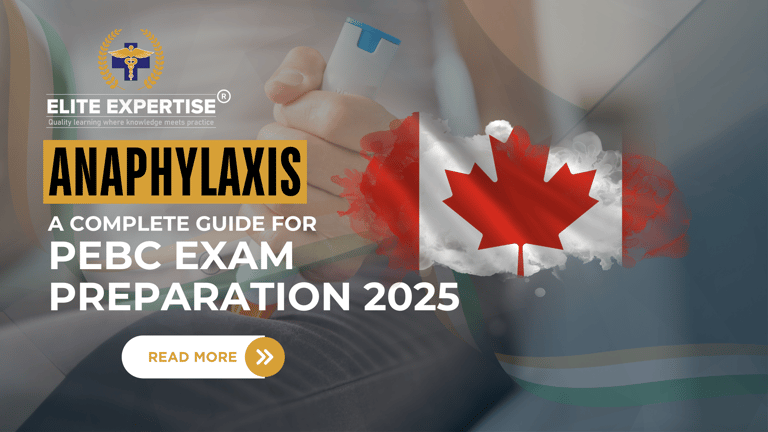ASK MY PHARMACIST | GOT QUESTIONS? Your pharmacist has answers. Click Here
Anaphylaxis: A complete guide for PEBC Exam preparation 2025
Complete 2025 PEBC exam guide on anaphylaxis. Learn causes, symptoms, diagnosis & first-line treatment with epinephrine for pharmacists
Krupa
9/16/20252 min read


Key takeaways:
Anaphylaxis is a severe emergency medical condition with rapid onset of action.
The drug of choice for anaphylaxis is Epinephrine. Administration of epinephrine delays an increase in mortality.
multiple systems like respiratory, cardiovascular, skin, Gastrointestinal systems shows symptoms of anaphylactic reactions
Common causes of anaphylactic reaction are from foods, drugs, insect stings, and latex.
The PEBC exam 2025, is the licensure exam conducted for international students who wish to work as a registered pharmacist in Canada. This exam focuses on recognition, first-line treatment, and emergency protocol which makes anaphylaxis a core topic
Pharmacists who are Preparing for the Pharmacy Examining Board of Canada (PEBC) in 2025, they need a strong understanding of emergency conditions like anaphylaxis. This is a life-threatening allergic reaction which is a high-yield topic for exams and clinical practice.
This guide explains what anaphylaxis is, its symptoms, causes, diagnosis, and management, with exam-focused notes to help pharmacy graduates succeed.
What is anaphylaxis?
It is a severe allergic reaction that affects multiple organs, which has rapid-onset of action. Anaphylactic reactions are often considered as an emergency medical condition which requires immediate treatment. Epinephrine is the only medication for anaphylactic reactions.
Anaphylatics reactions are IgE-mediated hypersensitive reaction
This type of reaction happens Within minutes to hours of allergen exposure
In Sever cases, it Can lead to airway obstruction, shock, or death if untreated
What are the symptoms of anaphylaxis?
What are the causes of anaphylaxis?
Common triggers includes:
Certain food items like peanuts, tree nuts, shellfish, milk, eggs causes severe reaction
From selected medications like penicillin, NSAIDs, chemotherapy drugs
From insect bites from bees, wasps, hornets
From products made of latex such as gloves, catheters, balloons
How is anaphylactic reaction diagnosed?
It is clinically diagnosed with certain criterias such as:
A History of allergic reaction due to allergen exposure
Rapid reaction with severe symptom
Causes sudden Hypotension or respiratory distress due to the exposure.
No laboratory tests can diagnose anaphylactic reactions. Treatment options should be given immediately without any delays
What are the treatment options for anaphylaxis?
For any anaphylactic reaction, rapid treatment is a must. First line medication is Intramuscular Epinephrine (0.3–0.5 mg IM, repeated every 5–15 mins if needed).
Emergency Management Steps for anaphylactic reactions are:
By standers Call emergency services immediately after noticing the allergic reactions
Administer epinephrine (auto-injector are available in most of the developed countries like Australia)
Patient should be placed in supine position with legs elevated
monitor vitals and Provide oxygen
Adjunctive therapies (after epinephrine):
Take Antihistamines (for skin symptoms)
Use Corticosteroids (to prevent further inflammatory reaction)
Extreme cases can go for Beta-agonists (for bronchospasm) under medical supervision
Conclusion:
In developed countries like Canada, Pharmacists are considered as frontline healthcare providers in emergencies. They are regulated to treat a critical condition which requires immediate intervention or treatment.
For aspirants, who are preparing for the PEBC exam in 2025, understanding a critical topic like anaphylaxis is very crucial. They should be able to recognize the symptoms, about epipen administration and effective patient counseling methods,. This understanding will help them in both exams and real life practice.


About the Author
Krupa Karamchand
Content Writer | Elite Expertise
Krupa Karamchand is a B. Pharm graduate and KAPS-qualified pharmacist with over 7 years of experience in the pharmaceutical field. As an experienced SEO content writer, she combines her in-depth healthcare knowledge with proven digital strategies to create informative, engaging, and search engine–optimized blogs. Krupa is passionate about making complex medical topics easy to understand and accessible to all readers.
Follow On
Follow Us
+91 76750 84909
Privacy Policy | © 2025 Elite Expertise . All Rights Reserved.
ELITE EXPERTISE PTY. LTD (ABN: 15668292439) (ACN: 668292439)
Australian Statutory Education License: OPP 2025 ELITE EXPERTISE PTY. LTD
Disclaimer
Elite Expertise is an online education platform dedicated solely to providing coaching and preparation services for the OPRA, PEBC, PSI and PTE exams. We do not offer any sponsorship or migration services. All information provided on our platform is for educational purposes only and should not be interpreted as legal or immigration advice. For inquiries regarding sponsorship, visa applications, or migration services, please consult with licensed immigration professionals or relevant authorities.
Elite Expertise is a trusted and results-driven training platform specializing in preparation for international pharmacist licensing exams. Our comprehensive courses, expert instructors, and proven methodologies have helped countless pharmacy professionals achieve their goals and succeed in competitive regulatory exams. We are proud of our strong success rate and commitment to excellence.
Elite Expertise is an independent training provider. We are not affiliated with any global pharmacy regulatory authorities or official exam-conducting bodies.
Copyright © 2026 Elite Expertise. All rights reserved.
Address
Unit 1/73 Beverley St, Doncaster East VIC 3109, Australia
